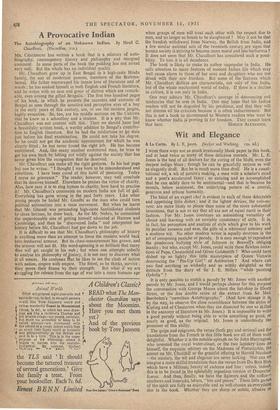A Provocative Indian
The Autobiography of an Unknown Indian. By Nirad C. Chaudhuri. (Macmillan. 2 is.) MR. CHROMIUM has written a book that is a mixture of auto- biography, contemporary history and philosophy and marginal comment. In some parts of the book the pudding has not mixed very well. But the whole has an individual quality.
Mr. Chaudhuri grew up in East Bengal in a high-caste Hindu family, the son of modernist parents, members of the Brahmo- Samaj. His father encouraged his innate love of literature and of words ; he has soaked himself in both English and French literature, and he writes with an ease and grace of diction which are remark- able, even among the gifted Bengalis. The first two hundred pages of his book, in which he presents the manners and customs of Bengal as seen through the sensitive and perceptive eyes of a boy in the early years of this century, are, to use the modern jargon, highly evocative. So, too, are his middle sections on the Calcutta that he knew as a schoolboy and a student. It is a pity that Mr. Chaudhuri was not content with this. Then we should have had a beautifully written book, a worthy addition to Bengal's contribu- tion to English literature. But he had the misfortune to 'go stale just before his final examination. He could not take his degree. So he could not get the academic appointment for which he was clearly fitted ; he has never found the right job. He has become embittered. And, like many another embittered man, he tries to get his own back by hitting out wildly against the society that has never given him the recognition that he deserved.
Mr. Chaudhuri can make all the right gestures. In his last page but one he writes: "I thought I was born to be misunderstood and rebellious. I have been cured of this habit of posturing. Today I nurse no grievance." The reader, however, may well conclude that he deceives himself. Elsewhere he praises the virtue of charity. Alas, how easy it is to sing hymns to charity, how hard to practise it l Mr. Chaudhuri's comments on modern India are full of gall. Everything has gone wrong in the past forty years. Like other young people he hailed Mr. Gandhi as the man who could turn political nationalism into a mass movement. But when he learnt that Mr. Ghandi was persuading high-caste Santiniketan students to clean latrines, he drew back. As for Mr. Nehru, he committed the unpardonable sins of getting himself educated.at Harrow and Cambridge, and then he "discovered India" and interpreted her history before Mr. Chaudhuri had got down to the job. It is difficult to see that Mr. Chaudhuri's philosophy of history is anything more than an attempt to force the modern world back Into mediaeval armour. But its chest-measurement has grown, and the armour will not fit. His word-spinning is so brilliant that many flies will get caught in his web ; but when one attempts soberly to analyse his philosophy of listory, it is not easy to discover what it all means. He confesses that he likes to see the clash of nation with nation, empire with empire. The fittest, as he thinks, survive ;
they prove their fitness by their strength. But what if we are struggling for release from the age of war into a more humane age
when groups of men will treat each other with the respect due to men, and no longer as beasts to be slaughtered ? May it not be that the Swedish withdrawal from Norway, the British from India, and a few similar national acts of the twentieth century ,are signs that human society is striving to become more moral and less.barbarous ? It does not seem that Mr. Chaudhuri has considered such a possi- bility. To him it is all decadence.
The book is likely to make its author unpopular in India. He calls attention to many features of modern Indian life which may well cause alarm to those of her sons and daughters who are not drunk with their new freedom. But some Of the features which Mr. Chaudhuri dislikes are characteristic, not only of free India, but of the whole mechanised world of today. If there is a decline in culture, it is not only in India.
One may admire Mr. Chaudhuri's courage in denouncing evil tendencies that he sees in India. One may hope that his Indian readers will not be disgusted by his petulance, and that they will not dismiss all his criticism because it is often indiscriminate. But this is not a book to recommend to Western readers who want to know whether India is proving fit for freedom. They cannot learn














































































 Previous page
Previous page